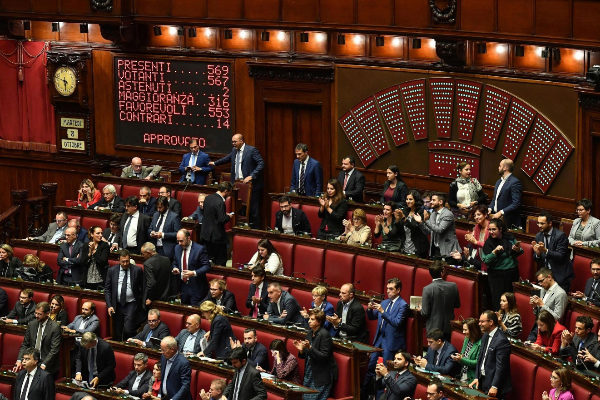- Italia.Conte obtains the confidence of the Chamber of Deputies and marks the beginning of a "reforming stage"
- Demonstrations: Salvini and the extreme right shake the streets against the Government of Conte
The Italian Chamber of Deputies has approved on Tuesday by a large majority the reduction of the number of parliamentarians in the two legislative chambers, which from now on will pass from 945 to 600 seats. Only the representatives of Más Europa voted, the formation led by Emma Bonino, along with some 'rebel' deputies. This is a constitutional reform promoted by the Five Star Movement, which in September put as a condition for its members of the Democratic Party the final approval of this bill to give the green light to a new Executive.
Italy is the second country in the European Union with the largest number of deputies and senators only behind the United Kingdom. With the reform approved on Tuesday, the number of deputies will be reduced from 630 to 400 and that of senators will go from 315 to 200. The reform also establishes a maximum ceiling of five life senators appointed by the president of the Republic.
The reduction in the number of deputies and senators in Italy is one of the historical battles of the Five Star Movement. The 'grillinos' calculate that a cut of parliamentarians will allow savings for the coffers of the State of around 500 million euros per legislature, although some studies such as the Observatory of Public Accounts of the Catholic University of Milan estimate the expected savings in little more From the half.
The previous government coalition, formed by the party founded by Beppe Grillo and the Matteo Salvini League, promised to approve the reform during the current legislature. However, the political crisis that precipitated the fall of the Executive in August forced the project to be postponed, whose last vote was scheduled to take place in early September. The PD, current partner of the M5E in the Government coalition, voted against the 'harakiri' in the last two consultations in Parliament, including the vote in July in the Senate. However, the party led by Luigi Di Maio demanded the approval of the reform as a "non-negotiable" condition to agree with the Social Democrats.
During the negotiations that gave the green light to the current Executive, the PD proposed to approve a new electoral law - the fourth in 20 years - before reducing the number of parliamentarians to avoid governance problems. However, after Matteo Renzi's split from the party, the Social Democrats had to step back and accept the M5E ultimatum. "We voted against because there was no adequate context, because this cut ran the risk of causing some territories to remain without representation," said the spokesman of the PD to the Chamber of Deputies, Graziano Delrio, justifying the change of opinion of the formation . "Our 'no' has become a 'yes' because our observations have been taken into account."
The Social Democrats have not been the only ones to warn of the risks of a reform apparently against the 'caste' aimed at saving a good pinch in public accounts. Some jurists have pointed out that reducing seats will reduce the representation of voters and the size of political groups, making them more controllable by their respective leaders and condemning the smaller regions to be underrepresented in Parliament. To avoid these risks, once the “tijeretazo” has been approved, the Government will begin the procedures to approve a new electoral law that will reorganize the distribution of seats and probably return to a proportional system. A new litmus test for the Executive of Giuseppe Conte.
Officially, the new composition of Parliament will not enter into force until the next legislature or before, if the chambers were dissolved early. In any case, since it is a constitutional reform, during the next three months after its publication in the Official Gazette, a confirmatory referendum could be convened if requested by a fifth of the Parliament, 500,000 voters or five regions, leaving in this case the Last word to the Italians.
According to the criteria of The Trust Project
Know more- Italy
- European Union
- Matteo Renzi
Venezuela The opposition reinvents itself in exile to corner Nicolás Maduro
Balearic Islands Salaries of 6,000 euros for the deputies of the shortest legislature
UEJosep Borrell saves his exam in the Eurocamera without startling

